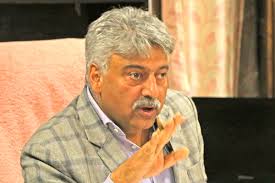Climate change is real: Dr. Ayaz Mohmood Dar
Mir Sabeen Gulrez
The annual observation of World Environment Day, which took place on June 5th, is a day intended to promote action for the preservation and conservation of the environment on our planet. The world gathered once more in 2023 to consider the health of our environment and talk about practical ideas to deal with the urgent issues we face.
World Environment Day 2023, with the theme “Taking Global Action for a Sustainable Future,” serves as an important reminder that the entire world community must work together to combat climate change, safeguard biodiversity, and work towards a greener and more sustainable future for all.
This year, World Environment Day focused on several key areas, including climate action, sustainable consumption and production, and the conservation of ecosystems. These areas are at the forefront of international discussions as we grapple with the consequences of human activity on the planet.
The impacts of climate change are becoming increasingly apparent, with rising temperatures, extreme weather events, and the loss of vital ecosystems. World Environment Day 2023 seeks to encourage individuals, communities, and governments worldwide to take decisive action in reducing greenhouse gas emissions, transitioning to renewable energy sources, and adopting sustainable practices in all aspects of life.
While talking to News Kashmir Magazine, the eminent expert Dr. Ayaz Mohmood Dar Founder & Director: Tehkeek International: An education and research Institute,Lecturer. Higher Education Department, Govt. of JK said that, “The reminder that the future of our world is in our hands comes in the form of World Environment Day 2023. Every person has a responsibility to protect the environment and create a sustainable future. We can guarantee a better, cleaner, and more durable planet for future generations by acting now”.
“Let’s take a moment to consider the great worth and beauty of our natural environment as we observe World Environment Day. Let’s work together to preserve and revitalise the environment while pursuing a peaceful coexistence of humans and nature. We can all benefit from our collective efforts to secure a sustainable future, he further stated.
Journalist Mir Sabeen Gulrez, through Dr Ayaz-on-Record answered questions like this,
Reporter :Data from the World Health Organization (WHO) shows that an estimated 4.2 to 7 million people die from air pollution worldwide every year. What’s the solution now what steps should we take to prevent that?
Dr Ayaz : It requires collective efforts from governments, communities, industries, and individuals to mitigate air pollution and prevent the millions of deaths caused by it each year. There are many steps that can be taken for mitigation, including Enhancing vehicle emissions standards, improvement in industrial emissions control, shifting to clean energy sources, International cooperation, and more importantly Supporting research and innovation.
Reporter : Do you acknowledge that climate change is real and poses an immediate threat to the environment and our health and safety? What specific goals and measures do you support for reducing U.S. carbon missions?
Dr Ayaz : Climate change is real and directly threatens the environment, health, and safety. To reduce carbon emissions, many measures can be taken which should include Carbon pricing, Electrification of transportation, and climate diplomacy.
Reporter : Do your congressional efforts align with the current administration to undermine the science that supports climate change research? Will you encourage federal (or state) agencies to restore scientific data about climate change to their websites to help educate citizens?
Dr Ayaz : Many administrations including the United States, recognize the need to address climate change and support climate science research. However, the scientific data about climate change on government websites to educate citizens is an important aspect for understanding the climate mechanics. The scientific information is very crucial for informed decision-making and public engagement on climate-related issues. The federal agencies should provide comprehensive information which will contribute to a well-informed society a research.
Reporter : What are your plans to support the accelerating adoption of solar and wind technologies? For example, would you support increasing research and development funds to advance renewable technologies?
Dr Ayaz : These are strategies that can be considered to support the accelerated adoption of solar and wind technologies. However, general strategies to support the accelerating adoption of solar and wind technologies will include increased research and development (R&D) funds, Education and trainings, and infrastructure development.
Reporter : Would you support tax credits to help businesses and consumers cover the costs of transitioning to solar and wind? Would you strive to ensure that renewable technologies become the top priority of state/national energy policy?
Dr Ayaz : “Yes”
Reporter : ’Will you support continuation of EPA’s ENERGY STAR program, which encourages appliance manufacturers to improve the energy efficiency of their products while providing consumers with tools that help them make energy-efficient choices?
Dr Ayaz : The EPA’s ENERGY STAR program’s future is determined by the relevant authorities responsible for energy efficiency standards and environmental programs, as well as various factors such as government policies, budget allocations, and public support. I cannot say anything about the decision-making process regarding the program’s continuation.
Reporter : What are your specific plans, including actions and timetables, for helping to reduce greenhouse gas emissions by a substantial amount, and how will you fund and implement them?
Dr Ayaz : Addressing climate change indeed necessitates a collaborative effort involving governments, businesses, communities, and individuals. The plans and actions to reduce greenhouse gas emissions will vary across regions and countries due to their unique circumstances and available resources. Cooperation and coordination at local, national, and international levels are essential for effective implementation.
The specific plans, actions, timetables, funding, and implementation would depend on the policies and actions taken by governments, organization’s, and individuals. Further, funding for climate resilience is must which can come from a variety of sources, including government budgets, private investments, public-private partnerships, international climate funds, and carbon pricing mechanisms.





